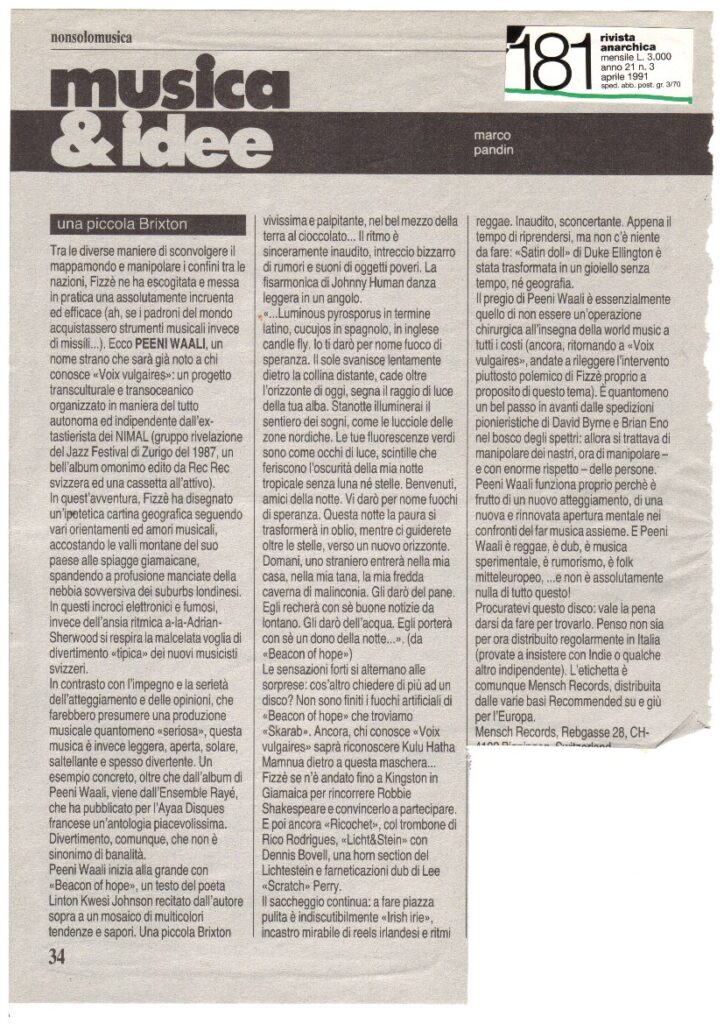translation:
There can be so many ways of disarranging a globe map of the world, upsetting and manipulating the borders that separate the nations. Fizzè found out a very special way, putting into practice a truly pacifist strategy to effectively redraw the map in new shapes (how I wish those in power would purchase musical instruments instead of wasting money in missiles…).
So here comes Peeni Waali, a strange name that should be already familiar to those of you who know “Voix vulgaires”. It’s a transcultural project that joins both the coasts of the ocean, a self-managed and independent initiative coordinated by Fizzè, once keyboardist with Nimal (an amazing act at the 1987 Zurich Jazz festival, they put out an album of the same name on the Swiss label Rec Rec, and a live cassette tape).
In this adventure, Fizzè rearranged a musical map of the world according to many different choices and preferences, approaching the mountain valleys of his homeland to the summer beaches of Jamaica, not to forget a handful of the subversive mist permanently clouding the London suburbs.
No rhythmical Adrian Sherwood-ish anxiety in this record: here you can freely breathe the mood for joking and amusement typical of certain new Swiss musicians. An honest commitment and an upright attitude give birth to a new kind of open music (another example of this “new wave of amazing contemporary music” is the album release of Ensemble Rayé, recently released on the French label Ayaa Disques). Anyway, amusement here is not just another word for banality.
Peeni Waali’s album first track is “Beacon of Hope”, a poem by Linton Kwesi Johnson performed by the composer himself over a multicoloured background. A small bright Brixton mosaic pulsating with so many tendencies and tastes, just in the middle of the land of chocolate. I have never heard such an attracting rhythm before. It’s an unheard interweaving of noise and sound. Johnny Human’s accodion dancing happily on the corner.
Strong feelings and amusement: can you aqsk for more to a record? “Beacon of Hope”’s flashes still echoing, and here comes “Skarab”. If you already know “Voix vulgaires…”, you will easily see Kulu Hatha Mamnua in disguise. Fizzè took a plane to Kingston, Jamaica, and asked Robbie Shakespeare and other friends some contribution. And again “Ricochet”, with well known and largely used in these recordings Rico Rodriguez on trombone, “Licht & Stein” with Dennis Bovell, a horn section from Liechtenstein and a dub-feverish Lee “Scratch” Perry.
It’s a complete mess on your mind, as you listen to “Irish Irie”, a wonderful gemstone of Irish reels and reggae rhythm: such music is unheard and someway upsetting. You’ve just the time to breathe, and you’re again in deep water listening to Duke Ellington’s masterpiece “Satin Doll”, heretotally rearranged in the form of a timeless jewel of no geography.
I find Peeni Waali is great because it’s no sort of musical cosmetic surgery. It’s not definetely world-music-at-all-costs: again, go back to the “Voix vulgaires” booklet and read Fizzè’s controversial writings on the subject.
Peeni Waali is a giant step forward David Byrne and Brian Eno’s pioneeristic expedition in the bush of ghosts: once the duo did manipulate tapes, today Fizzè deals with people, and he does his job with extreme respect.
Peeni Waali works because it’s the long-awaited new approach to making music. It’s a new and fresh and clean and open minded attitude, a definetively new way in creating music and love together. And Peeni Waali is reggae, it is dub, it is experimental music, it is rumorism, it is folk music from the middle of Europe… and it sounds nothing like these labels!
The only thing you should really do now is to purchase this record (go to Orders)…
Rivista Anarchica

